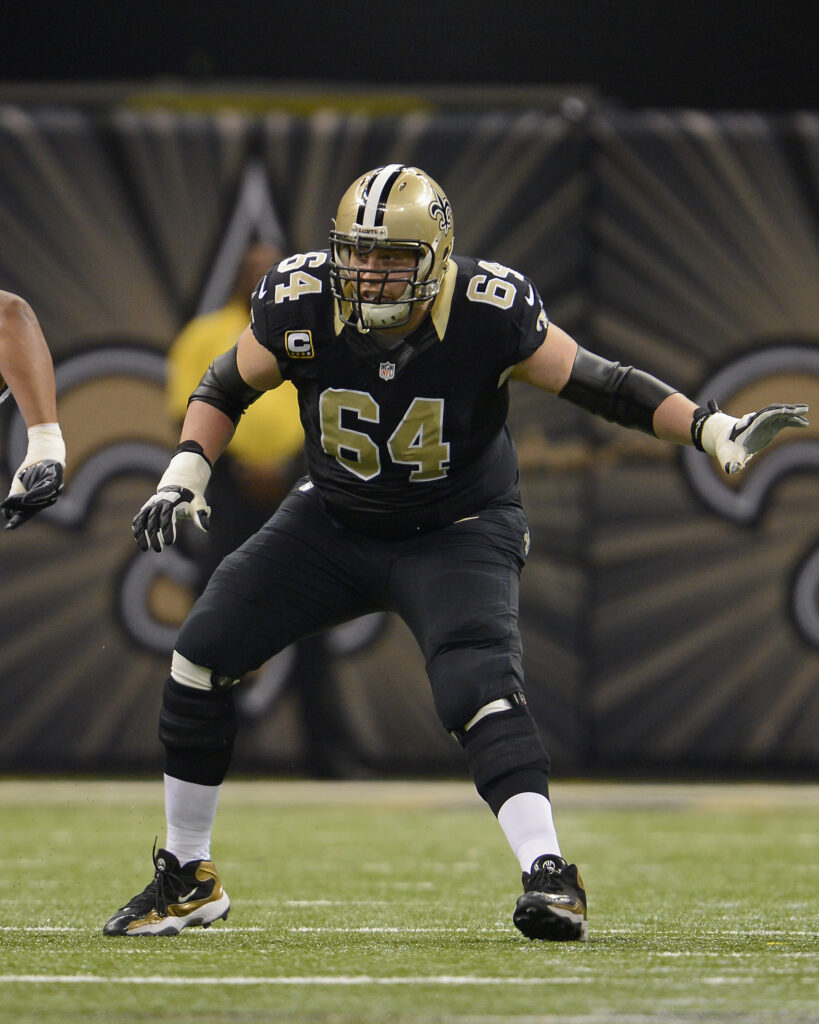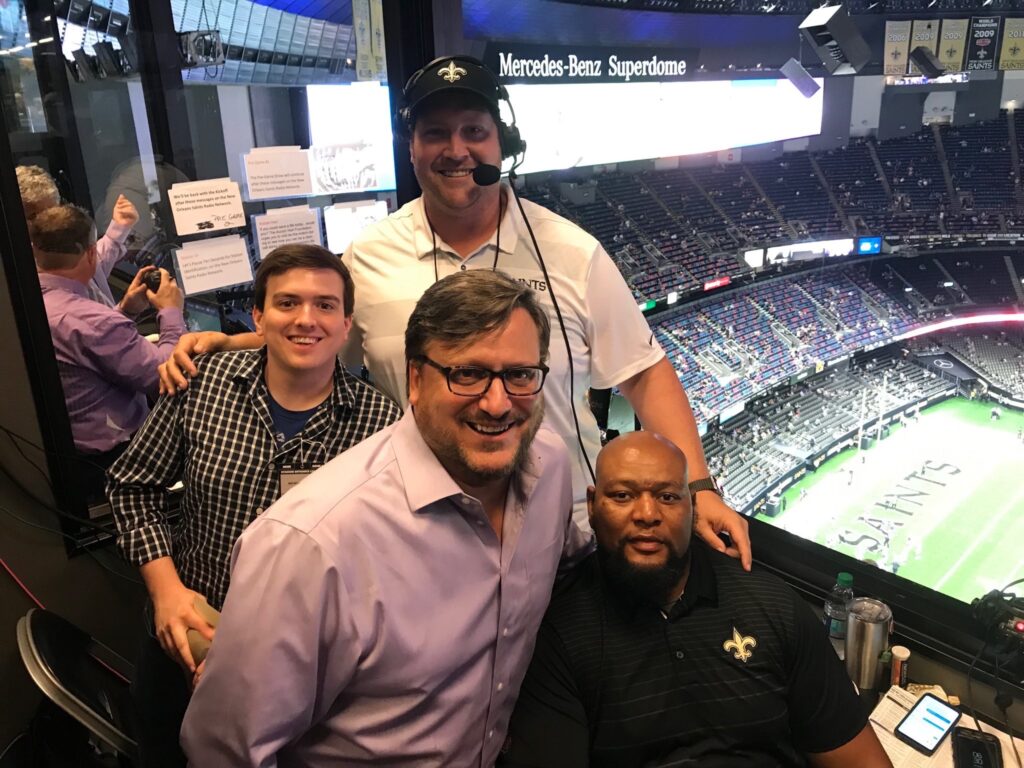Lead Blocker: Entrepreneur and Former Saints Player Zach Strief

by Leslie Cardé
WHEN ZACH STRIEF RETIRED from the New Orleans Saints in 2018, after a stellar career at right tackle, he was part of a statistic- setting offensive line. He had seen it all. He was drafted in 2006 out of Northwestern, the same year the team returned to New Orleans’ rebuilt Superdome after Hurricane Katrina, and the same year that Sean Payton came on as head coach. That team would go on to win the Super Bowl after the 2009 NFL season, making Strief part of the most successful era in franchise history.
Leaving the NFL was bittersweet, but a 2017 knee injury cinched his departure. And, once knowing that Ryan Ramczyk, a first-round draft pick who’d taken Strief’s place while he was injured, was more than capable of defending Drew Brees from unwanted hits, it made his exit more palatable. And, after all, his coach Sean Payton had always emphasized that NFL careers are short, and that no one begins his life’s work until after he’s finished playing professional football. So, for Strief, at 34, now what?

“Leaving the Saints, there were two things I said I would never do,” remembers Strief. “Although both of these professions made the most sense as a logical transition from professional sports, I swore I would never get into broadcasting, nor would I become a coach.”
Ah, famous last words. Strief laughs about it now, but at the time, the allure of business was calling, and he was seriously debating about going back to school to get his MBA. However, a conversation he had on a boat propelled him in a slightly different direction.
“I was on vacation with my wife, when my father-in-law, attorney Tom Discon, mentioned that he and his best friend Ricky Thomas, owner of Blue Runner Foods, had been talking about opening a craft brewery for the past five to six years,” recounts Strief. “I thought to myself I didn’t know much about running a brewery/restaurant, and being in business with family was something my own father had always warned me against. However, in speaking to my dad about this proposition, his assessment was that I could either go back to school for my MBA, or get one on the fly, by learning from some really accomplished business people who would guide me and teach me.”
And so, The Port Orleans Brewing Company was born on Tchoupitoulas Street, smack in the middle of what was once known as the Storyville District along the Mississippi river. Once upon a time it was notable for its red light district, made famous in the film “Pretty Baby” with Brooke Shields. But, it was also a center of commerce with a slew of very profitable businesses. The area was often credited as the birthplace of jazz, back when Jelly Roll Morton was on the music scene there, so it’s always been a center of activity.
Meanwhile, as other investors entered the Port Orleans picture, with Charlie Barnett, Mike Tilly and Dean Lacey coming on board, Zach invited his longtime friend Don Noel, former COO of the New Orleans Hamburger and Seafood Company, to take the reins as managing partner. The result was a wildly successful brewery and restaurant which appealed to the discerning hops and barley palates of New Orleanians everywhere.
But, how does that John Lennon song go, “Life is what happens to you while you’re busy making other plans”? With consummate TV and radio broadcaster Jim Henderson set to retire, including stepping down from his post as the Voice of the Saints announcer on WWL Radio, a vacuum was about to occur in the broadcast booth. One which the radio giant was eager to fill. A bevy of New Orleans broadcasters applied for the job, but it ultimately went to recently retired Zach Strief, the man who had previously said he would never become a broadcaster. His former teammate Deuce McAllister had already been in the booth with Henderson for a couple of seasons and warned Strief that broadcasting wasn’t as easy as it looked, no matter how well you knew the game.
“He showed a lot of candor in that moment,” explains Strief. “He pointed out that while he was green, he had Henderson to show him the ropes, but that I would have him, and as he duly pointed out, he was still trying to figure out what he was doing.”
Undeterred, Strief marched forward in his new role as play-by- play analyst. Before Henderson walked out the door, he showed Strief some of the important mechanics of the job, but Zach didn’t have much time to rehearse. It’s important to note here that former NFL players, like Tony Romo who now works for CBS, were groomed long before they donned headsets and a microphone. In fact, Strief’s former teammate Drew Brees has had the luxury of NBC’s “boot camp”, before he will ever utter a word as a studio analyst for “Football Night in America.” But, it was a total stranger who empathized with Strief’s plight as a neophyte that would change the trajectory of the newbie’s broadcast career.
“Gerry Sandusky, the voice of the Baltimore Ravens, reached out to me blindly,” recounts Strief. “He told me that when he first got into broadcasting, no one gave him any help, and he didn’t want me to go through the same thing. He’d read in various publications the concern out there about players like me going directly from the field to the broadcast booth, so his empathy and his help was beyond fantastic. He was the single biggest influence, putting me squarely in the right direction. He has remained a good friend.”
A quick study, Strief slid into his new role with grace and professionalism. Being in broadcasting, as he noted, kept him engaged with the Saints organization, and around the teams he had spent so much time with. He was always more than a media type, strolling into locker rooms whenever he wanted, as he’d been there and done that. But, somehow, it didn’t feel like enough.
When I started watching game tapes as part of my play-by-play job, I would notice things from the eye of a player, and thought I could probably help some of these guys,” recounts Strief. “But, should the play-by-play guy be calling the starting right guard and giving him advice? I did it with the guys I knew, but otherwise it just wasn’t a comfortable space.”

Life continued for Zach Strief, during the NFL season as a broadcaster, and during the off-season as an active participant in the brewery. And then, in March 2020, the pandemic hit, shuttering the restaurant and bar, as the brewery still produced beer for the grocery stores.
But, there wasn’t enough work to keep the entire staff employed, and there was a great desire to help the community of restaurant industry workers who suddenly found themselves without a way to put food on their own tables. Out of this need, POB United, a charitable foundation, was created. The brewery utilized its own kitchen, and made food for people who no longer had the means to buy their own. And, while the restaurant owners absorbed the costs involved in keeping their own employees on, feeding those in need would require an infusion of cash.
“I put out a group text to about 20 current and former linemen and explained that we wanted to provide free meals to those who’d been waylaid from the service industry, and that in order to do that, we needed money,” remembers Strief. “I pointed out how good that industry had been to us, often giving us a table for 14 with two hours-notice on a Friday night. Within the first 24 hours, we had $70,000.”
The boys in black and gold had come through. Of course, no one ever dreamed that the pandemic and the attendant restaurant restrictions would go on for nearly as long as they did. But, forging ahead, the brewery formed an alliance with the Brees Dream Foundation, allowing them to partner with others in the food industry, even creating food boxes for those being discharged from the hospital, who needed food, but shouldn’t be going to grocery stores. Each box contained three meals a day for seven days, consisting of fresh meat, produce, and canned goods. With vouchers in hand, thousands came to the brewery to have their trunks loaded with food, curbside. Over the next six months, the charity raised over $250,000 and gave out over 100,000 meals.
“You know, any time you open a business, it’s a big risk,” notes Strief. “I played my whole career in New Orleans, my wife is from New Orleans, and there was a very strong pull to re-invest in my community. I wanted to create jobs, and we’ve done so much more—we’ve been instrumental in helping the community itself.”
For Zach Strief, life has come full circle. And, that coaching job he said he’d never take, when first leaving the Saints as a player? Well, never say never. Less than three months ago, he held a press conference announcing he was leaving the broadcast booth to become an offensive line coach for the New Orleans Saints.
“What tipped the scales for me was Coach Payton calling and saying there was going to be an opening with the offensive line,” says Strief, thinking back. “A couple of conversations later, I realized I needed to stop fighting the urge I had with wanting to be involved again. This was an opportunity to work with my coach, my GM, and my guys, in a town I was already living in. If I didn’t do it now, would I regret it?”
For coach Payton, he knew exactly why he wanted Zach Strief back in the fold, as he eloquently explained.
“Zach was not only an outstanding player, but is one who understands the intent of every play and the game plan as a whole. He understands the multiple schemes and how to impart that knowledge to the players, which will be beneficial to the team in his new role. I think that players, regardless of their age or experience, genuinely appreciate coaches who are willing to help them improve. You only need to be around Zach for a few minutes and you realize how intelligent he is and how he’s able to effectively communicate. It should not be a difficult transition for him because he’s been around our program for so long and understands the way we do things here. He’s doing a great job already, and I’m excited for him.”
As for finding his life’s work after being a pro football player? He not only found Act Two, but Three and Four, as well. In May, his brewery launched a new hazy IPA called Vice Versa, a nod to the dichotomy that is New Orleans— devoutly religious people on one hand and Bourbon Street on the other. A little of this and a little of that. Decidedly New Orleans, and decidedly Zach Strief.







